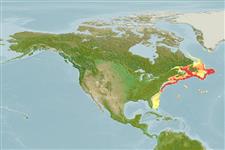>
Gadiformes (Cods) >
Phycidae (Phycid hakes)
Etymology: Phycis: Taken from Greek, phykon = seaweed; because of the habits of this fish that lives hidden among them (Ref. 45335).
Eponymy: Captain Hubbard C Chester (1836–1886) made a number of whaling voyages before being appointed sailing master of the Arctic exploring steamer Polaris (1871). [...] (Ref. 128868), visit book page.
More on authors: Goode & Bean.
Environment: milieu / climate zone / depth range / distribution range
Ecologia
marinhas bentopelágico; não migratória; intervalo de profundidade 90 - 1500 m (Ref. 40643), usually 360 - 800 m (Ref. 1371). Temperate; 61°N - 24°N, 81°W - 40°W
Western Atlantic: Canada to straits of Florida, found in the outer continental shelves and slopes, but not abundant to south of Cape Hatteras.
Tamanho / Peso / Idade
Maturity: Lm ? range ? - ? cm
Max length : 42.0 cm NG macho/indeterminado; (Ref. 58426)
Espinhos dorsais (total) : 0; Espinhos anais: 0. Dorsal fin with an extremely elongated ray, its length longer than head length. Longest pelvic-fin ray reaching beyond the posterior end of the anal-fin base. Olive on sides, belly pale; the margins of the dorsal, caudal and anal fins darker.
Epibenthic (Ref. 58426). Minimum depth at 90 m (Ref. 1371). Most abundant between 360 and 800 m. Feeds mostly on crustaceans (especially euphausiids, shrimps and amphipods (Ref. 5951)) but also on mollusks and fishes (Ref. 1371).
Life cycle and mating behavior
Maturidade | Reprodução | Desova | Ovos | Fecundidade | Larvas
Cohen, D.M., T. Inada, T. Iwamoto and N. Scialabba, 1990. FAO species catalogue. Vol. 10. Gadiform fishes of the world (Order Gadiformes). An annotated and illustrated catalogue of cods, hakes, grenadiers and other gadiform fishes known to date. FAO Fish. Synop. 125(10). Rome: FAO. 442 p. (Ref. 1371)
Categoria na Lista Vermelha da IUCN (Ref. 130435: Version 2024-1)
Ameaça para o homem
Harmless
Utilização humana
Pescarias: de interesse potencial
Ferramentas
Relatórios especiais
Descarregue XML
Fontes da internet
Estimates based on models
Preferred temperature (Ref.
123201): 2.9 - 5.7, mean 4.1 °C (based on 56 cells).
Phylogenetic diversity index (Ref.
82804): PD
50 = 0.6255 [Uniqueness, from 0.5 = low to 2.0 = high].
Bayesian length-weight: a=0.00380 (0.00183 - 0.00790), b=3.12 (2.93 - 3.31), in cm total length, based on LWR estimates for this (Sub)family-body shape (Ref.
93245).
Nível Trófico (Ref.
69278): 3.2 ±0.0 se; based on diet studies.
Resiliência (Ref.
120179): Baixo, tempo mínimo de duplicação da população 4,5 - 14 anos (Preliminary K or Fecundity.).
Fishing Vulnerability (Ref.
59153): Moderate to high vulnerability (55 of 100).
Nutrients (Ref.
124155): Calcium = 23.6 [13.1, 48.0] mg/100g; Iron = 0.285 [0.155, 0.529] mg/100g; Protein = 16.2 [14.8, 17.5] %; Omega3 = 0.397 [0.186, 0.795] g/100g; Selenium = 26.7 [10.9, 61.0] μg/100g; VitaminA = 34.8 [8.2, 147.2] μg/100g; Zinc = 0.635 [0.421, 0.947] mg/100g (wet weight);
